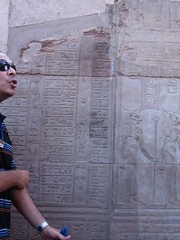
Kom Ombo is another Greco-Roman temple, built by the Ptolemies. It is absolutely unique because it is a double temple.

The double entryway leads, on the left, to the temple of Haroeris (a version of Horus) and, on the right, to the temple of Sobek the crocodile god. All the way through it is mirrored this way. For a nifty map, click here.
Quite a bit of the lovely original colors remain. This is a carving above the entry:

Here's Sobek:

The goddess on the left here is Anuket, goddess of the flood, after whom our boat was named.

Here Ihab is explaining this carving, which is an Egyptian calendar.

I like this carving because it shows how religious symbols are "passed around".

In Egypt, according to Ihab, these four winged figures denote the four winds. (the figure on the lower right is damaged, but it should be a winged man.) In Christian iconography, these are the symbols of the four Evangelists, or Gospel writers: the ox for St. Luke who emphasized Christ as sacrifice, the lion for St. Mark who begins his Gospel with the voice of "one crying in the wilderness", the eagle for St. John, whose prologue describes Christ in soaring terms, and the man (the missing figure) for St. Matthew who shows Christ as the Son of David.
By this time it was getting close to sunset, and the light was a lovely warm gold:

Because this is a temple to Sobek, there were ponds of sacred crocodiles on the site. Some of the crocs are still here:

Ewg! Crocodile mummies!
Dad says he's getting a little "templed-out" after today. That's not good! We've only seen four temples so far and we have four more, plus tombs in the next few days.

No comments:
Post a Comment